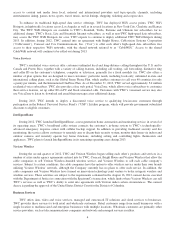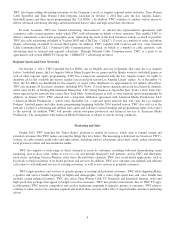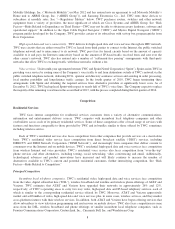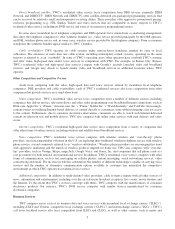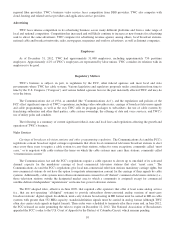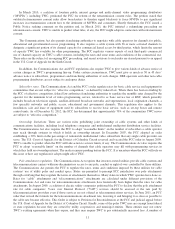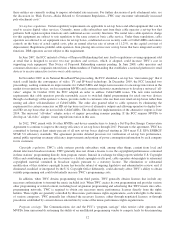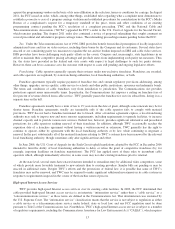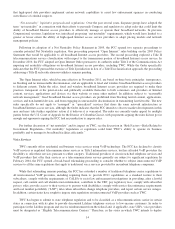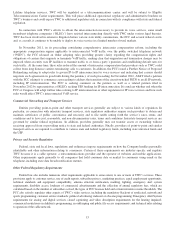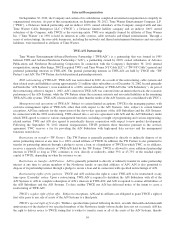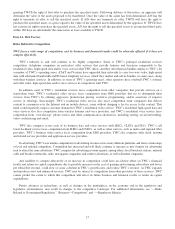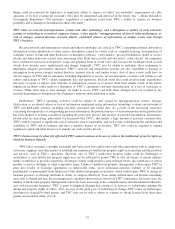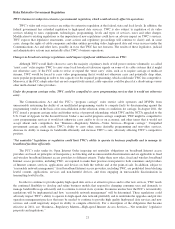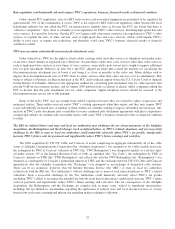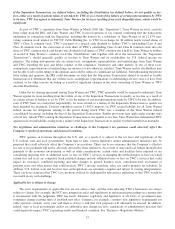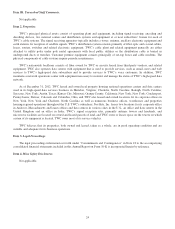Time Warner Cable 2012 Annual Report Download - page 24
Download and view the complete annual report
Please find page 24 of the 2012 Time Warner Cable annual report below. You can navigate through the pages in the report by either clicking on the pages listed below, or by using the keyword search tool below to find specific information within the annual report.that high-speed data providers implement certain network capabilities to assist law enforcement agencies in conducting
surveillance of criminal suspects.
“Net neutrality” legislative proposals and regulations. Over the past several years, disparate groups have adopted the
term “net neutrality” in connection with their efforts to persuade Congress and regulators to adopt rules that could limit the
ability of broadband Internet access providers to effectively manage or operate their broadband networks. In previous
Congressional sessions, legislation was introduced proposing “net neutrality” requirements, which would have limited to a
greater or lesser extent the ability of high-speed Internet access service providers to adopt pricing models and network
management policies.
Following its adoption of a Net Neutrality Policy Statement in 2005, the FCC opened two separate proceedings to
consider potential Net Neutrality regulation. One proceeding proposed “Open Internet” rules building on the 2005 Policy
Statement that would be applicable to all broadband Internet access providers. The second proceeding explored a Title II
telecommunications service classification with respect to the transmission portion of broadband Internet access service. In
December 2010, the FCC adopted an Open Internet Order pursuant to its authority under Title I of the Communications Act
imposing net neutrality obligations on broadband Internet access providers, including TWC. While the Order specifically
indicates that the FCC pursued the exercise of Title I jurisdiction in lieu of a Title II reclassification approach, the proceeding
addressing a Title II reclassification nevertheless remains pending.
The Open Internet rules, which became effective in November 2011, are based on three basic principles: transparency,
no blocking and no unreasonable discrimination, and are applicable to fixed and wireless broadband Internet access providers
to different extents. Under the rules, fixed and wireless broadband Internet access providers are required to make their
practices transparent at the point-of-sale and publically available thereafter to both consumers and providers of Internet
content, services, applications and devices via their website or some other method. In addition, subject to “reasonable
network management,” fixed broadband Internet access providers are prohibited from blocking lawful content, applications,
services and non-harmful devices, and from engaging in unreasonable discrimination in transmitting lawful traffic. The new
rules specifically do not apply to “managed” or “specialized” services that share the same network infrastructure as
broadband Internet access services, although the Order indicates that the FCC intends to observe market developments in this
area and may take further regulatory action if it believes it is warranted. The rules are currently under appeal by multiple
parties before the U.S. Court of Appeals for the District of Columbia Circuit, with proponents arguing the rules did not go far
enough and opponents arguing the FCC had no jurisdiction to impose rules.
For further discussion of “net neutrality” and its impact on TWC, see the discussion in “Risk Factors—Risks Related to
Government Regulation—‘Net neutrality’ legislation or regulation could limit TWC’s ability to operate its business
profitably and to manage its broadband facilities efficiently.”
Voice Services
TWC currently offers residential and business voice services using VoIP technology. The FCC has declined to classify
VoIP services as regulated telecommunications services or Title I information services, but has afforded VoIP providers the
flexibility to offer their services pursuant to either category. Traditional providers of circuit-switched telephone services and
VoIP providers that offer their services as a telecommunications service generally are subject to significant regulation. In
February 2004, the FCC opened a broad-based rulemaking proceeding to consider whether to subject interconnected VoIP
services to all the same regulations that apply to traditional voice services provided by incumbent telephone companies.
While that rulemaking remains pending, the FCC has extended a number of traditional telephone carrier regulations to
all interconnected VoIP providers, including requiring them to: provide E911 capabilities as a standard feature to their
subscribers; comply with the requirements of CALEA to assist law enforcement investigations in providing, after a lawful
request, call content and call identification information; contribute to the USF; pay regulatory fees; comply with subscriber
privacy rules; provide access to their services to persons with disabilities; comply with service discontinuance requirements
and local number portability (“LNP”) rules when subscribers change telephone providers, and report certain service outages.
In addition, certain states have sought to impose state regulation on interconnected VoIP providers such as TWC.
TWC has begun to submit to state telephone regulation and to be classified as a telecommunications carrier in certain
states in connection with its plan to provide discounted Lifeline telephone services to low-income customers. In order to
participate in the Lifeline program and receive reimbursement from the federal and, if applicable, state USFs, voice providers
must be designated as “Eligible Telecommunications Carriers.” Therefore, in the states in which TWC intends to deploy
14


